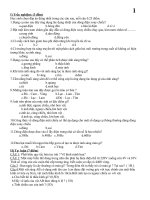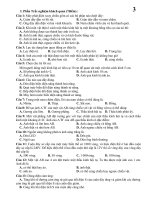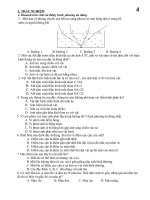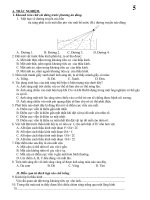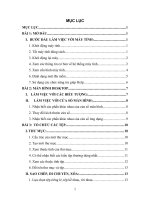Tài liệu ĐỀ CƯƠNG THAM KHAO AV9 HKI
Bạn đang xem bản rút gọn của tài liệu. Xem và tải ngay bản đầy đủ của tài liệu tại đây (189.52 KB, 12 trang )
Huong Tho Phu Secondary school
Full name: ---------------------------------------
ĐỀ CƯƠNG THAM KHẢO MÔN ANH VĂN 9 HKI NĂM HỌC 2010-2011
I/ TENSES : ( thì )
1. Simple past tense (Thì Quá khứ đơn )
* Từ nhận diện : yesterday, last, ago, mốc thời gian ở quá khứ ví dụ 1995, 2002, …
- To be : was, were
I/ He/ She/ It/ 1 was ( not ) _ Was I/ he/ she / it / 1--- ?
We/ You/ They/ 2 were ( not ) _ Were we/ you/ they/ 2 ---?
- Ordinary verbs : ( động từ thường )
Động từ có qui tắc ( hợp qui tắc ) : thêm “ed” ( Ved ) _ Phủ định: didn’t + V _ Nghi vấn: Did + S +V ?
Động từ bất qui tắc : sử dụng cột 2 ( V2)
2. Present perfect tense ( Thì Hiện tại hoàn thành )
* Từ nhận diện : since , for , just , already , recently , ever , never , yet, up to now, so far, …
- Cách chia :
+ Khẳng định: He / She / It / 1 : has + V3/ed
I / we / you / they / 2 : have + V3/ed
+ Phủ định : hasn’t / haven’t + V3/ Ved
+ Nghi vấn : Has/ Have + S + V3/ Ved ?
So sánh thì Quá khứ đơn và thì Hiện tại hoàn thành:
Simple past tense (Thì Quá khứ đơn ) Present perfect tense ( Thì Hiện tại hoàn thành )
+ Diễn tả hành động bắt đầu và kết thúc trong quá
khứ.
Ex: I thought the problem two hours ago.
+ Diễn tả hành động bắt đầu trong quá khứ nhưng đến
hiện tại vẫn chưa xong.
Ex: I have thought about the problem for several
hours.
+ Diễn tả hành động/ sự kiện ở quá khứ không có mối
liên quan đến hiện tại.
Ex: I had dinner but I feel hungry now.
+ Diễn tả hành động/ sự kiện có kết quả ở hiện tại.
Ex: I have had dinner and I am full now.
+ Diễn tả hành động/ sự kiện đã xãy ra biết rõ thời
gian trong quá khứ.
Ex: I saw this film yesterday.
+ Diễn tả hành động/ sự kiện đã xãy ra nhưng không
xác định rõ thời gian.
Ex: I have seen this film before.
EXERCISES: Put the verbs into the correct form: simple past or present perfect tense:
1. How long -------------------------- you ( know ) -------------------------- her? _ For six years.
2. I ( not see ) -------------------------- her since 2003.
3. In the 1960s, many university and college students ( wear ) -------------------------- jeans.
4. In the 1970s, more and more people ( start ) -------------------------- wearing jeans because they
( become ) -------------------------- cheaper.
5. In the 1980s jeans finally ( become ) -------------------------- high fashion clothing, when famous
designers ( start ) -------------------------- making their own styles of jeans with their labels on them.
6. Jeans ( never, be ) -------------------------- out of fashion.
7. Poets, writers and musicians ( mention ) -------------------------- the ao dai in poems, novels and songs
for centuries.
8. In the 18
th
century, workers ( love ) -------------------------- wearing jeans because the material ( be )
-------------------------- very strong and it ( not, wear ) -------------------------- out easily.
9. They ( visit ) ----------------------- Da Lat last summer.
10. We ( learn ) ----------------------- English since 2001.
11. He ( be ) ----------------------- sick yesterday, so he ( not, go ) ----------------------- to school.
12. Nobody ( see ) ------------------------------- him since last week.
- 1 -
13.I ( lose ) -------------------------- my pen. I can’t find it anywhere.
14.Nam ( buy ) -------------------------- a new dictionary yesterday.
15.His hair is very short. He ( have ) -------------------------- a haircut.
16.------------------- you ( visit ) -------------------------- One-Pilla Pagoda when you were in Ha Noi?
17.My bicycle isn’t here anymore. Somebody ( take ) -------------------------- it.
18.When ----------------------- you ( start ) ------------------- to school? _ When I was six.
19.I ( not eat ) ----------------------- anything yesterday because I ( not feel ) ----------------------- hungry.
20.The glasses look very clean. ----------------------- you ( wash ) -------------------------- them ?
21.I don’t know Hung’s sister. I ( never see ) -------------------------- her .
22.Nga ( receive ) -------------------------- Jenny’s letter a week ago.
23.My father ( take ) -------------------------- me to the National Museum when we were in Ha Noi.
24.We ( not go ) -------------------------- to play the soccer match last Sunday because of the rain.
25.We are good friends. We ( know ) -------------------------- each other for a long time.
26.--------------------- you ( ever go ) -------------------------- sailing?
27.In the 18
th
century jean cloth ( make ) -------------------------- completely from cotton.
28.Try not to be absent from class again for the rest of the term. You ( miss, already ) -------------------- too
many classes. You ( miss ) -------------------------- two classes just last week.
29.Bill ( arrive ) ----------------------- here three days ago. He ( be ) ---------------------- here since the 22th.
30.Last January, I ( see ) -------------------------- snow for the first time in my life.
31.Anne ( see, never ) -------------------------- snow.
32.So far this week, I ( have ) -------------------------- two tests and a quiz.
33.I ( not, see ) -------------------------- him since he ( leave ) -------------------------- school.
34.How long you -------------------------- ( study ) -------------------------- English? _ For two years.
35.Mr. and Mrs. Ba ( take ) -------------------------- some beautiful photos. They ( take ) ------------------
them a few days ago.
II/ Modal verbs with “if” : ( Động từ khiếm khuyết dùng với câu có mệnh đề “if” )
If clause Main clause
Simple present tense
( hiện tại đơn )
I/ We/ You/ They/ 2_ V/ don’t +V
He/ She/ It/ 1 _ Vs/es / doesn’t + V
can/ could/ should/ may/ might/ + V
must/ ought to/ have to/ has to/ …
1. If you want to get good grades, you ( must) ----------------------- study hard.
2. You have to ( go ) ----------------------- to university if you want to study medicine.
3. If you (want ) ----------------------- to lose weight, you should ( do ) --------------------- morning
exercises.
4. If he ( not, come ) ----------------------- soon, he might ( miss ) ----------------------- the train.
5. You ought to ( stay ) ----------------------- in bed if you ( want ) ----------------------- to get well.
6. You must ( do ) ----------------------- your homework if you want to go out.
7. If you ( want ) ----------------------- to pass the exam, you should ( work ) ----------------------- harder and
harder.
8. If we ( want ) ----------------------- to be there in time, we must ( take ) ----------------------- a taxi.
9. If it ( stop ) ----------------------- raining, we can ( go ) ----------------------- home.
10.She looks ill. She ought to ( go ) ------------- to the doctor if she ( want ) ----------------- to get better.
III/ GERUND ( Danh động từ : động từ thêm “ing” )
- 2 -
Theo sau các trường hợp sau đây ta thường sử dụng động từ thêm “ing”:
1.Verbs ( Động từ): like, love, hate, enjoy, stop, suggest ( đề nghị ), practice/ practise ( thực hành),
miss ( bỏ lỡ ), avoid ( tránh ), begin, start, spend , … + V.ing
Ex: a. The sale of jeans stopped growing because the worldwide economic situation got worse in the 1990s.
b. She practices speaking English everyday.
2. Prepositions ( Giới từ ): in, at, for, from, to, by, after, before, …
Theo sau các giới từ nếu là động từ thì thông thường là hình thức động từ dạng nguyên mẫu thêm “ing”
Ex: a. I’m good at drawing.
b. He doesn’t concentrate on the lesson. He thinks of listening to pop music.
3. be used to/ get used to/ look forward to/ be fond of + V.ing:
Ex: a. My father is used to getting up early. b. I am fond of wearing jeans.
EXERCISES : Use the correct forms of verbs in the brackets:
1. You should practice ( listen ) ----------------------- to English tape or English programs on the radio.
2. Lan is interested in ( learn ) ----------------------- English.
3. I am looking forward to ( hear ) ----------------------- from you soon.
4. How much time do you spend ( surf ) ----------------------- the web a day?
5. Hong Hoa often spends most of her time ( wander ) ----------------------- because she just doesn’t know
which webside is useful.
6. We enjoy ( listen ) ----------------------- to music.
7. I don’t like ( watch ) ----------------------- sports because some sports are violent.
8. In Viet Nam people love ( read ) ----------------------- newspapers and magazines.
9. In the 1970s, jeans became cheaper so many, many people began ( wear ) ----------------------- jeans.
10.More and more people started ( wear ) ----------------------- jeans because they became cheaper.
IV/ PREPOSITIONS: ( Giới từ )
1. Prepositions of time ( Giới từ chỉ thời gian )
Giới từ Cách dùng Ví dụ
at trước giờ at 5 o’clock
on trước thứ, ngày, ngày tháng, thứ buổi on Monday, on 14
th
, on March 4
th
2005, on Friday
morning, …
in trước thời gian dài hơn như buổi, tháng,
năm, mùa, thế kỷ, …
in the morning/ afternoon/ evening, in September, in
2002, in the summer, in the 19
th
century, in the
future, …
for trước khoảng thời gian ( không xác
định )
for two hours, for a week, for ages,…
since trước điểm thời gian ( xác định ) since two o’clock, since last week, since yesterday,
…
between
…and ...
trước hai điểm thời gian between Monday and Saturday, between 2 o’clock
and 5 o’clock, …
from ..to/
up to …
trước hai điểm thời gian from Monday to Saturday, from 2 o’clock to 5
o’clock, …
before/
after
trước điểm thời gian before/ after Christmas
before/ after 5 pm
till/ untill trước điểm thời gian để chỉ một hành
động nào đó kéo dài bao lâu
till/ untill Monday
till/ untill 10.30
* Một số cụm giới từ cần chú ý:
at Christmas, at night, at midnight, at this time, at that time, at the moment, at present, at the end of the
week,…
On weekends, on the weekend, on Christmas Day, on Christmas Eve, on New Year Eve,…
- 3 -
EXERCISES
I/ Complete these sentences, using “in”, “at” or “on”:
1.He was born --------- May 6
th
, 1985.
2.They got up early ------- the morning and set off for their home village ------ 5 o’clock.
3.My birthday falls ------ Octorber. It’s -------- the First.
4.They work in shifts and their shifts begin -------- midnight.
5. ------Sunday mornings, he does nothing but relax.
6. ------ the 1980s jeans became high fashion clothing.
7.She is at work ------- present.
8.What are you going to be ------ the future? _ A teacher.
9.My birthday is ------- October 1
st
.
10.We’ll go on a trip -------- September.
II/ Complete these sentences, using “ after, at, between, by, during, for, in, on, since, until”:
1.Mr. Thanh isn’t here at the moment. He’ll be back ------------- a few minutes.
2.We were at the seaside ---------------- two weeks.
3.I haven’t seen Liz ------------------ Monday.
4.There are usually a lot of parties ------------------ New Year’s Eve.
5.Can I meet you -------------- 8 am and 9 am?
6.We met a lot of people --------------- our holiday.
7.They don’t like traveling --------------- night.
8.Ten o’clock is a bit early. We should come -------- that.
9.Where’s Trang? She should be here ----------- now.
10.Mrs Nhung has gone away. She’s been away ------------ Friday.
2. Prepositions after adjectives or verbs ( Giới từ theo sau tính từ hoặc động từ ):
1. impressed by : có ấn tượng bởi
2. depend on : tuỳ thuộc vào
3. keep in touch : giữ liên lạc
4. different from : khác biệt so với
5. divide into : chia ra thành
6. separated by : được tách bởi
7. consist of : bao gồm
8. take … from : lấy từ
9. add … to : thêm … vào
10. name after : đặt tên dựa theo
11. make from : làm từ
12. make in : sản xuất tại
13. wear out : mòn đi
14. go up : tăng lên
15. be out of fashion : lỗi thời
16. be fond of : thích
17. proud of : tự hào về
18. feel equal in : cảm thấy bình đẳng về
19. show .. to : bày tỏ … cho
20. the same … as : cùng, bằng
21. feel like : cảm thấy như là
22. speak … to/ with : nói chuyện với
23. learn by heart : học thuộc lòng
24. work for : làm việc cho
25. look forward to : mong mỏi
26. be interested in : quan tâm
27. use … for : sử dụng … để
28. get access to : tiếp cận với
29. according to : theo
30. respond to : đáp lại
31. come from : bắt nguồn từ
32. discribe as : mô tả như
33. prefer … to … : thích … hơn
34. say to someone : nói với ai
35. go on a picnic : đi dã ngoại
36. look for : tìm kiếm
37. look after : trông nom
38. take someone to … : dắt ai tới
- 4 -
EXERCISES : Complete each sentence with one correct preposition:
1. Malaysia is devided ------------ two regions.
2. Mary was really impressed ------------ the beauty of Hanoi.
3. It’s very kind -------------- you to say so !
4.Can you tell me how many chapters this book consists ----------- ?
5. Nam has known Hoa since they were in primary school and they still keep --------- touch.
6. I want to have a trip abroad but it all depends ------------- my parents.
7. I prefer historical novels ------------- detective stories.
8. I look forward ----------------- hearing from my brother, who is living abroad.
9. We are very proud ---------- our school.
10. The ao dai used for men is different --------------- those used for women.
11. Young people love wearing jeans because they are very strong and do not wear ----------- easily.
12. I’m very fond --------------- wearing jeans because they are convenient.
13. They added lines of poetry ------------ the ao dai to make it modern ann fashionable.
14. Sales of jeans went ------------ and the shopkeepers got a lot of money.
15. The word Jeans comes --------------- a kind of material that was made in Europe.
16. She describes herself -------------- a fashion designer.
17. Wearing unifom helps students feel equal --------------- many ways..
18. The weather was bad, so we didn’ t go ---------- a picnic.
19 They started to walk ----------- the village .
20. Nam is living with the Smiths and their son is the same age ----------- Nam.
21. Van feels ---------------- a member of The Barker’s family.
22. What did that man say ---------- you?
23. Our teacher often tells us to learn --------- heart all the new words.
24. I’m really looking forward -------------- seeing you again.
25. I’m interested ------------- learning English.
V/ WISHES:
I/ Điều ước không có thật ở tương lai: S
1
+ wish/wishes + S
2
+ would(not) + V
(inf)
II/ Điều ước không có thật ở hiện tại: S + wish/wishes + S + Quá khứ giả định ( qkbtc )
[ Ved/V2/ didn’t + V
Were / Weren’t ]
Rewrite the following sentences, using “ Wish”
Chú ý: Điều ước và sự thật phải luôn trái ngược nhau.
Ex: I don’t have a computer. ( Tôi không có máy vi tính )
I wish I had a computer. ( Tôi ước gì tôi có máy vi tính )
1. You are not very tall. I wish -------------------------------------------------- .
2. It’s so hot. You want to be in the swimming pool. I wish -------------------------------------------------- .
3. You don’t have a sister. I wish -------------------------------------------------- .
4. You live very far from school. I wish -------------------------------------------------- .
5. You don’t have your friend’s phone number. I wish -------------------------------------------------- .
6. You draw very badly. I wish -------------------------------------------------- .
7. You don’t know many friends. I wish -------------------------------------------------- .
8. There aren’t any rivers and lake in your hometown. I wish -------------------------------------------------- .
9. Ba can’t have a new bicycle. Ba wishes -------------------------------------------------- .
10. Hoa can’t visit her parents. Hoa wishes -------------------------------------------------- .
11. I don’t pass the exam. I wish -------------------------------------------------- .
12. It rains. We wish -------------------------------------------------- .
13. He can’t fly. He wishes -------------------------------------------------- .
14. They don’t stay in Hue. They wish -------------------------------------------------- .
VI/ PASSIVE VOICE:
Công thức chung : be + past participle ( Ved/ V3 )

